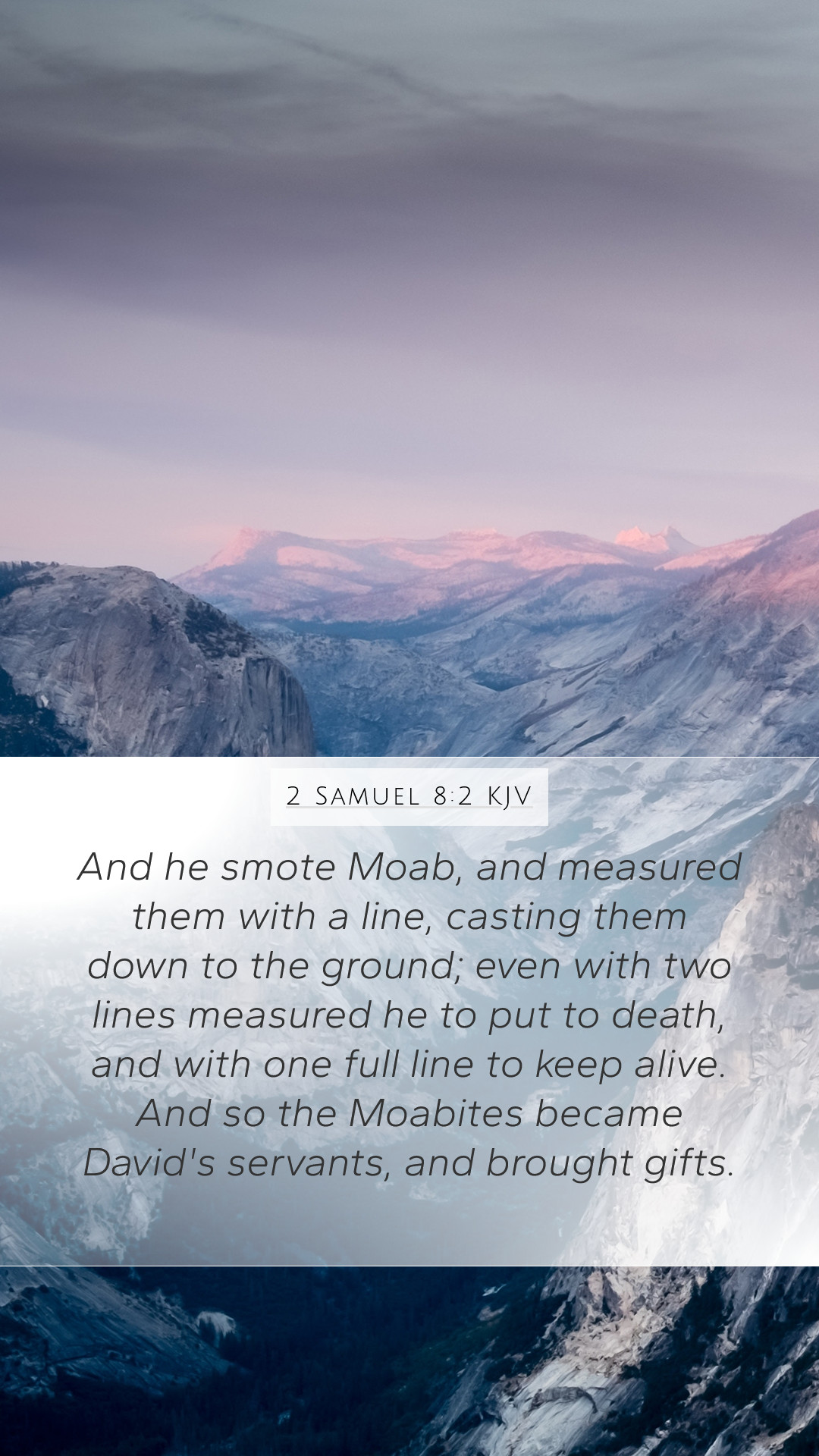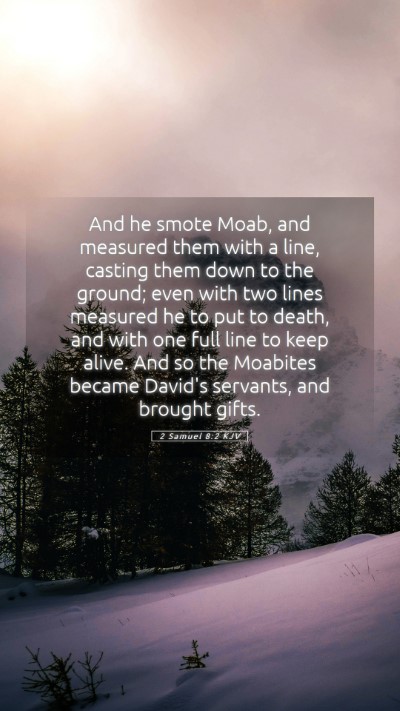Old Testament
Genesis Exodus Leviticus Numbers Deuteronomy Joshua Judges Ruth 1 Samuel 2 Samuel 1 Kings 2 Kings 1 Chronicles 2 Chronicles Ezra Nehemiah Esther Job Psalms Proverbs Ecclesiastes Song of Solomon Isaiah Jeremiah Lamentations Ezekiel Daniel Hosea Joel Amos Obadiah Jonah Micah Nahum Habakkuk Zephaniah Haggai Zechariah Malachi2 Samuel 8:2 Meaning
What is the meaning of 2 Samuel 8:2?
And he smote Moab, and measured them with a line, casting them down to the ground; even with two lines measured he to put to death, and with one full line to keep alive. And so the Moabites became David's servants, and brought gifts.
2 Samuel 8:2 Bible Verse Meaning
Bible Verse Meaning: 2 Samuel 8:2
Verse: "And he smote Moab, and measured them with a line, casting them down to the ground; even with two lines measured he to put to death, and with one full line to keep alive: and so the Moabites became David's servants, and brought gifts." (2 Samuel 8:2)
Summary of Bible Verse Meanings: This verse describes King David’s victory over Moab, showcasing both his military prowess and strategies in warfare. The act of measuring with a line symbolizes a methodical and decisive approach to conquest.
Contextual Understanding
Historical Context: The Moabites had been enemies of Israel for generations, and their defeat under David signifies the expansion of his kingdom and the establishment of Israel's dominance in the region. Such victories were crucial for the consolidation of power and territories during David's reign.
Bible Verse Interpretations
- Matthew Henry's Commentary: Henry emphasizes that David's conquests were not merely for personal glory but served as a means to establish justice and order in a realm plagued by enemies. He points out that the process of measuring reflects a divine judgment upon those defeated.
- Albert Barnes’s Notes: Barnes highlights the cruelty often involved in ancient warfare, interpreting the measured lines as a restriction of life and death, which underscores the harsh realities of power struggles and subjugation in that era.
- Adam Clarke’s Commentary: Clarke provides a spiritual interpretation, suggesting that the victory over Moab represents the triumph of the faithful over sin, illustrating God’s sovereignty in securing His people's safety.
Detailed Explanation
The act of measuring out the Moabites for death or life captures the severity and precision of David's military campaign. The utilization of a line to determine fate reflects the harshness of wartime decisions and the authoritative control a king had over life and death. David's approach shows strategic brilliance as he not only sought to incapacitate the enemy but also allowed for subjugation through servitude, which ensured a steady tribute and allegiance from the Moabites.
The verse illustrates a turning point for Israel under David’s leadership. It signifies not just a military victory but a theological statement that God was backing David's reign, as the successes of the Israelites often indicated divine favor.
Application for Bible Study
Understanding 2 Samuel 8:2 provides key insights for Bible study groups. It highlights themes of divine justice, the moral complexities of leadership, and the implications of violence in the name of national interests.
For those asking, “What does 2 Samuel 8:2 mean?” it is crucial to delve into its historical context, reflect on the moral questions it raises, and consider how such events resonate with contemporary issues of power and authority.
Related Bible Cross References
- 1 Samuel 14:47 - David's victories over enemies.
- 2 Samuel 10:6-8 - Further confrontations with the Ammonites and allies.
- Psalm 60:8 - David mentions Moab in a psalm about conquest.
In-Depth Bible Verse Analysis
The nuanced meanings behind David's actions in this verse extend to concepts valuable for Bible study lessons. It integrates themes such as conflict management, mercy versus justice, and national obligation, all of which provoke thought and debate in a Bible study group setting.
Conclusion
2 Samuel 8:2 offers profound insights into the nature of kingship, God’s sovereignty, and the moral fabric of war. Its lessons are relevant for understanding Scripture today and can enrich discussions in online Bible study platforms. Engaging with such texts allows for a deeper comprehension of the challenges faced by leaders and the implications of their choices.


